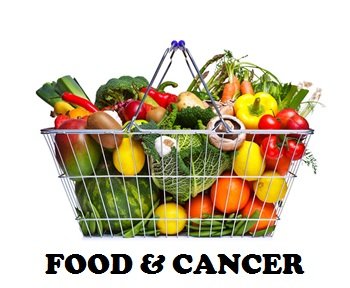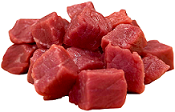
Cancer is possibly the most feared and fearful disease of all that affect humanity. It is a group of diseases involving abnormal cell growth with the potential to invade or spread to other parts of the body. Huge efforts have been made throughout the world in order to discover its contributory factors. The most important of these factors, improper diet was noted in the nineteenth century. Unfortunately, until recently, the medical establishment paid little attention to the proposals and anyone who might propose that certain foods might help prevent or treat cancer was considered a quack. However, in recent decades there has been a speedy increase in scientific proof that eating certain food has a great deal to do with cancer.
FACTORS THAT CAUSE CANCER:
Diet (35%), Tobacco (30%), Genetics (6%), Viral causes (5%), Work environment (4%), Solar radiation (3%), Environmental Pollution (3%), Alcohol (3%), Others (11%).
FOOD AS A CAUSE OF CANCER
From the stated percentage value of the various factors that cause cancer (above), diet is today’s primary cancer-causing factor. It is truly ironic that foods, which should provide health and life, should become the principal cause of cancer. Obviously, something must be wrong with the dietary habits of the bulk of the developed world population: The eating of too many animal-based foods which foster cancer instead of plant-based foods which help prevent against it. Animal-based foods are a rich source of carcinogens i.e. substances that foster the development of cancer e.g. tobacco smoke, nitrites, etc.

FOOD THAT PROMOTE CANCER
Meat (Red-meat, grilled, fried, salted or cured): Numerous scientific studies have revealed that meat consumption is a significant risk factor in most types of cancer.

Alcoholic beverages: All alcoholic beverages promote cancer, even those considered to have medical values. These do not require large does to cause cancer.

Milk: Excessive whole milk (not nonfat) consumption is associated with the appearance of some types of cancer (breast, lung, ovarian, prostate and urinary bladder).
.jpg)
Fish: There is a relationship between regular fish consumption (salted or cured fish) with cancers of the larynx, nasopharynx, endometrium, and pancreas.
.jpg)
Egg: There is statistical evidence that excess egg consumption (3+ a week) is associated with cancers of breast, stomach, lung, pancreas, colon, endometrium, and ovaries.
Refined products: Their lack of fiber, excess sugar content and trans fatty acids explains their relationship with cancer.
.jpg)
Spices: A diet that is rich in hot spices can be a risk factor for certain types of cancer such as cancer of the mouth and esophagus.
Coffee: Its consumption has been associated with cancer of the urinary bladder and with fibrocystic mastopathy or fibrocystic disease of the breast, which can be precancerous. This effect is due to the caffeine content. Consequently, decaffeinated coffee also increases the risk of urinary bladder cancer.
Sugar: Excess white sugar has been linked to colon, stomach and cervical cancer.

FOOD THAT HELP PREVENT CANCER:
Fruits: Fruits together with vegetables, is the most effective anticarcinogenic food. Certain studies have shown that abundant fruit consumption prevents most of the cancers that affect humans.
Olive oil: Studies conducted reveals that when it is substituted for other dietary fats, it reduces the risk of breast cancer.
.jpg)
Whole grains: The fiber in whole grain accelerated movement through the bowel. It also retains and removes carcinogenic substances that may be in the digestive tract, excreting them with the feces.

Yogurt: In contrast to milk, its content of active bacterial cultures and lactic acid partially explains this protective effect.
Legumes: These in general protect against cancer because of their richness in fiber and anticarcinogenic phytochemicals such as phytic acid and phytates.
.jpg)
DIET FOR PREVENTING VARIOUS TYPES OF CANCER
| TYPE OF CANCER | FOODS TO INCREASE | FOODS TO REDUCE |
|---|---|---|
| Larynx | Fruits, Green leafy vegetables, Vegetable oil, Antioxidant vitamins (A, C & E) | Alcoholic beverages, Cured meta, Mate’ |
| Nasopharyngeal | Vegetables, Carotene (provitamin A) | Salted fish (particularly for infants), Very hot tea or infusions, Smoked products, Salted products |
| Brain | Vitamins (particularly C & E) | Hot dogs (consumption by pregnant women increase risk of cancer in their children), Hamburgers, Cured and roasted meat, Processed pork products, Fried foods |
| Mouth | Fruits (particularly citrus), Vegetables, (particularly those rich in carotenes) | Alcoholic beverages (particularly wine and liquors), Meat, especially roasted or barbequed, Chilies (hot pepper), Mate’ |
| Esophageal | Fruits, Vegetables, Beta-cartoene (provitamin A) and carotenoids, Fiber | Alcoholic beverages, Very hot beverages especially mate’, Red meats, Pickles |
| Lungs | Fruits and vegetables | Cured meat, Beer, Whole milk and dairy products, Eggs, Refined baked goods |
| Stomach | Fruits, Vegetables (independent of their nitrate content), Garlic and onion, Whole grain bread, Vegetable oil, Pasta and rice | Red meta, Cured meat and sausages, Beer, Salt-cured foods, Eggs, Rolls and pastries, Sugar, Saturated fat |
| Liver | Vegetables, Beta-carotene (provitamin A) | Pork, Wine and other alcoholic beverages, Moldy foods or those with aflatoxin residue |
| Breast | Soy, Fruits, Vegetables (especially carrot and spinach), Olive oil, Garlic, Yogurt, Fibre, Vitamin C, Beta-carotene (provitamin A), Vitamin E | Red meat, Processed pork, Eggs, High-fat cheese, Fat, Trans fatty acids (margarine and commercial baked goods), Alcoholic beverages, Chocolate and pastries |
| Colon | Fiber, Fruits, Vegetables, Whole-grain bread and pasta, Fermented dairy products (yogurt) and Calcium | Red meat, Liver and other variety meat, Eggs (particularly for women), Fats and high calorie foods (especially animal based), Cured high-fat cheese, Sugar, Alcoholic beverages |
| Kidney | Fruits, Salads, Vitamins C & E | Red meat, Meat products, Chicken, Fat, Proteins |
| Pancreatic | Fruits, Vegetables (especially cabbage and tomatoes), Grains, Legumes, Fiber, Yogurt | Meat, Fish, Eggs, Proteins, Cholesterol, Saturated animal fat, Calories, Alcoholic beverages |
| Prostate | Fruits, Tomatoes, Dried fruits, Legumes, Soy, Citrus pectin, Garlic, Fructose, Vitamin E, Carotenoids (lycopene) | Red meats, Milk, Animal fat, Calcium from foods or supplements |
| Ovarian | Vegetables, Whole-grain bread and pasta, Fish | Meat, Whole milk, Saturated fat, Eggs, Butter |
| Endometrial | Fruits, Vegetables, Whole grain cereals, bread and pasta, Legumes, Garlic and onion, Beta-carotene | Red meat, Cured or salted fish, Eggs, Animal fat, Margarine, Cholesterol |
| Urinary Bladder | Fruits, Vegetables (particularly spinach and carrots), Beta-carotene | Pork and lamb, Coffee, Milk, Pickles, Fat, particularly |
Finally, be conscious that there is a intimate relationship between cancer and the diet. Some cause it while some help prevent it. For those wishing to reduce the risk of cancer, this is the most concise dietary counsel. ADOPT A VEGETARIAN DIET... live a cancer free life.
Source: (New Lifestyle... Healthy Foods)
This post recieved an upvote from minnowpond. If you would like to recieve upvotes from minnowpond on all your posts, simply FOLLOW @minnowpond
Resteemed by @steemvote - send only 0.5 SBD to get your post resteemed to 1,5K follower and receive Bonus-Upvotes